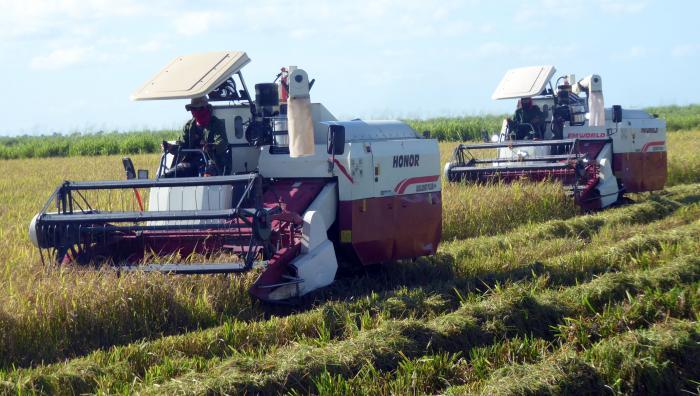
Pinar del Río.-"We have to make the most of this experience, since it is a high-producing country, which knows about it and is willing to help us".
This was stated by Member of the Political Bureau and Vice President of the Republic Salvador Valdés Mesa, after visiting in this province areas of the Cuba-Vietnam Joint Program for rice production.
After a first harvest that exceeded 1,000 hectares, the novel initiative is entering a second campaign.
Some 90 hectares have already been planted in this new campaign, on flat terraces in the municipality of Los Palacios, and it is expected that planting will also extend to Consolación del Sur.
Cuban Vice President was interested in the seeds used, the yields achieved in the field, and the results after the milling process.
He also verified the work being carried out with the machinery that has been arriving as part of the program for soil preparation and harvesting.
Valdés Mesa stressed that, as a strength, Cuba has an infrastructure developed by Commander in Chief Fidel Castro Ruz, which includes flat terrace systems, irrigation canals, airstrips and large industries.
Although national production has been very depressed in recent years due to the shortage of inputs and fuel, he affirmed that "we also have development, we have culture, we have the land, and the most important thing, which is human resources".
He insisted on the need to make the most of the experience of Vietnamese specialists in a crop that distinguishes that country worldwide, and called to ensure that they can deploy here all their capacity and knowledge.
"This has to work out well," he said. As part of his visit to Vueltabajo, Valdés Mesa was also interested in the progress of rice production in the specialized sector and what is known as popular rice, which includes thousands of farmers throughout the province.
In this regard, he learned that, unlike other territories in the country, which have difficulties with the availability of water, Pinar del Río reservoirs guarantee to assume the planned figures, and even exceed them.
Hence, of the 13,100 hectares initially agreed for 2025, 13,807 have already been planted, and the intention is to add a total of more than 3,000 hectares above the annual plan.
"We have achieved that there is a movement and a lot of willingness of people to plant rice," he said.















